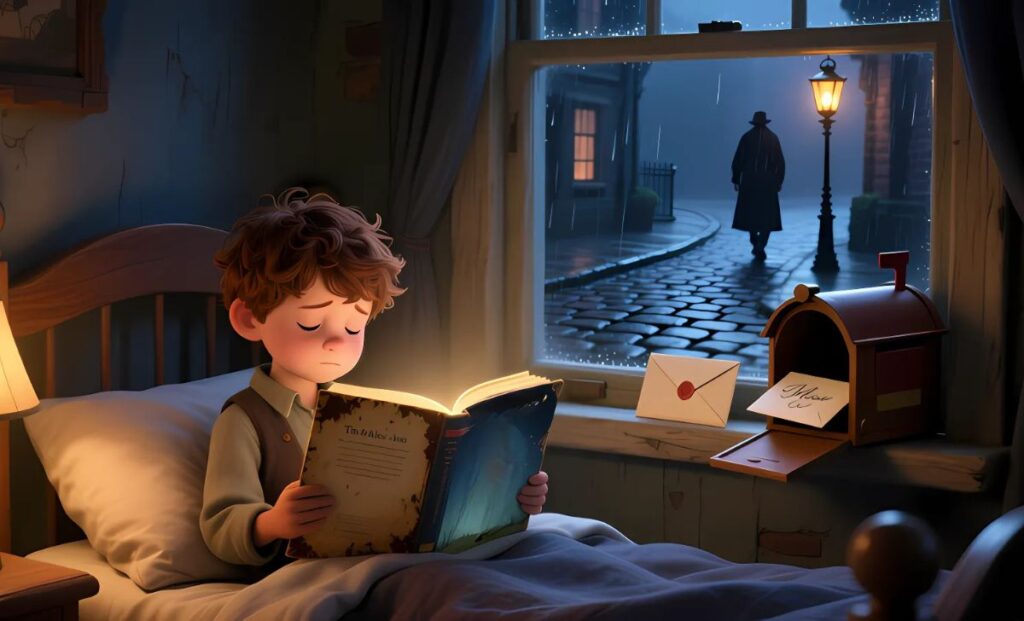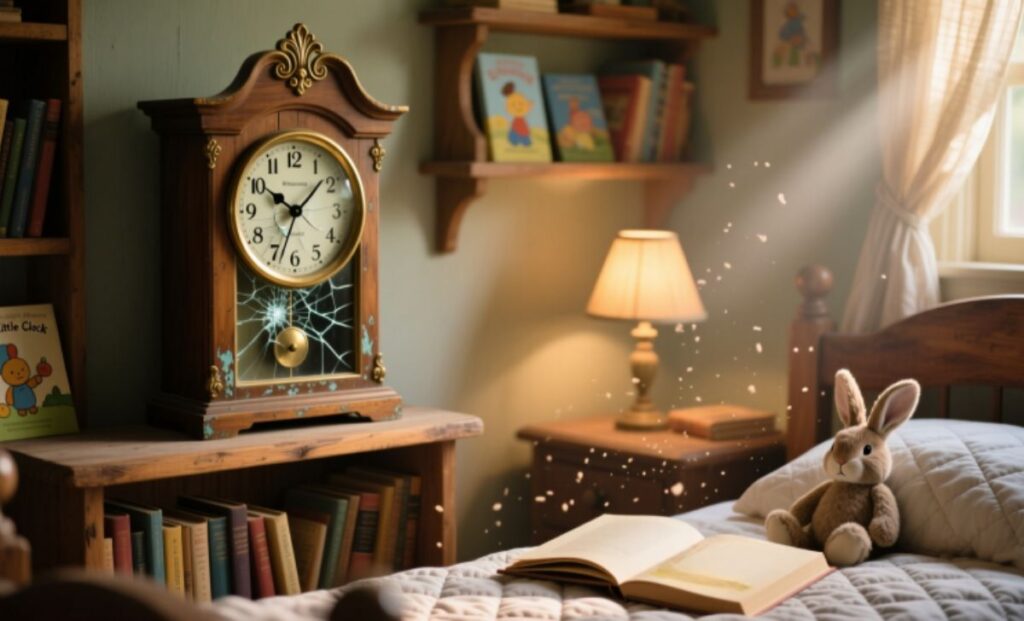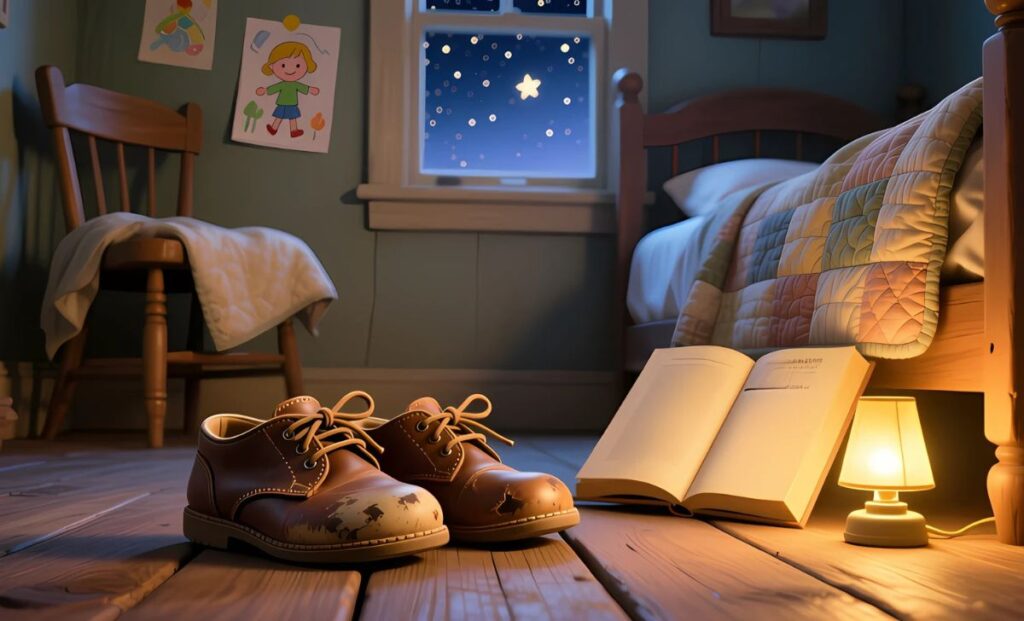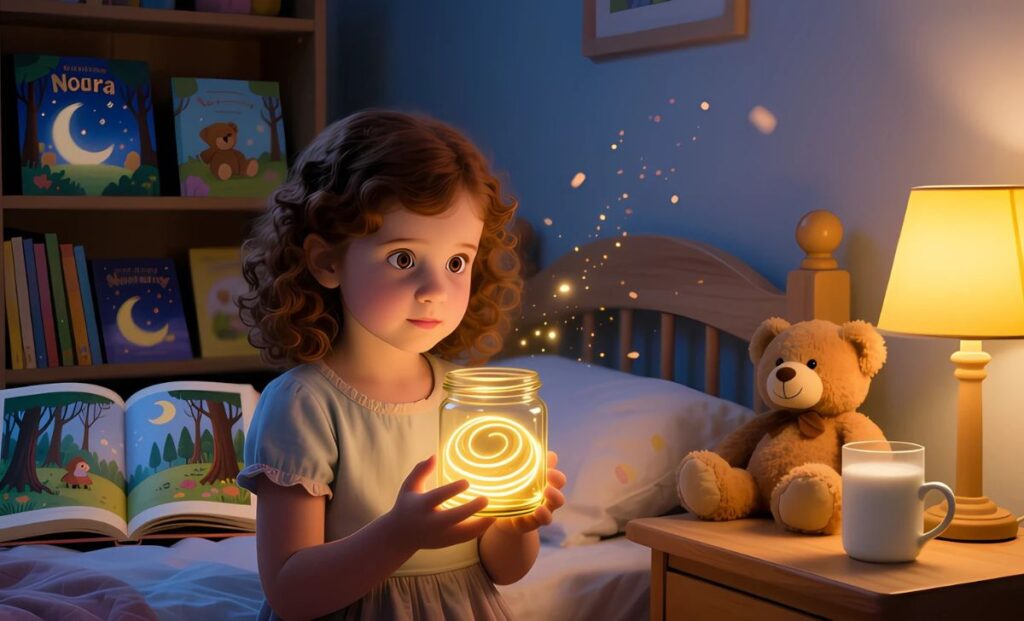It’s 8:45 p.m. The day has been long, messy, and maybe a little loud. The dishes are still in the sink, your phone keeps buzzing, and your kid is bouncing on the bed like a trampoline. You’re tired. They’re tired, even if they swear they aren’t. And then comes that familiar request:
“Read me a story.”
Here’s the thing. You don’t always have a new book in your hand. You might not even remember where the last one went. (Check under the couch, maybe.)
But you do have your phone or tablet. And thank goodness for that, because in 2025, you can pull up thousands of bedtime stories to read online free in seconds.
That’s the world we live in. But the big question is: Does it still count? Is reading from a screen as magical as flipping through an old paperback with dog-eared pages?
And more importantly, does it still create that cozy, safe bubble kids need before sleep? Let’s talk about it.
Bedtime Stories to Read Online Free
Looking for magical bedtime stories to read online free? Curl up, get cozy, and let these tales carry you and your little one into dreamland.
1. The Cloud Who Painted the Sky

Once upon a time, high above the fields and forests, there lived a little cloud.
It wasn’t very big.
It wasn’t very fluffy.
It was just… ordinary.
At least, that’s what the other clouds thought.
The other clouds were busy with important cloud jobs.
Some brought rain to the thirsty fields.
Some drifted high and light, keeping watch over the world.
Some gathered into storms, crackling with lightning.
But the little cloud?
It didn’t like raining.
It didn’t like storming.
And floating aimlessly felt boring.
So, the little cloud often drifted off on its own.
One evening, as the sun began to set, the little cloud noticed something.
The sky wasn’t plain blue anymore.
It was glowing pink and orange and gold.
The little cloud gasped.
“Who painted this?” it whispered.
The big clouds rumbled with laughter.
“Silly little one,” they said. “The sun does that every night.”
But the little cloud didn’t believe it.
The sun might shine bright, yes.
But these colors felt… different.
They felt like magic.
That night, the little cloud couldn’t sleep.
It tossed.
It turned.
Finally, it floated closer to the horizon, just in time to see the sun dipping low.
As the golden light stretched across the sky, the little cloud reached out.
Just a tiny stretch.
And—oh!
A streak of orange clung to its edges.
The little cloud shivered with delight.
The color was warm.
It was alive.
It was like holding a secret.
The next evening, the little cloud tried again.
This time it dipped lower, brushed against the glowing rim of the setting sun.
Pink splashed across its fluffy side.
Purple shimmered along its bottom.
The little cloud twirled in the air.
It laughed so hard that a few droplets of rain sprinkled out.
But instead of falling gray, the drops glistened—tiny sparkles of rose and gold.
Down below, a farmer looked up and gasped.
“Would you look at that,” she whispered. “A rainbow rain.”
The little cloud discovered something new.
It didn’t have to rain like the others.
It didn’t have to storm.
It could paint.
Every night, when the sun sank, the little cloud gathered colors.
It brushed pink across the sky.
It splashed orange like waves.
It smeared purple until the stars peeked through.
And the people below began to notice.
They stood at their windows.
They pointed from their porches.
Children squealed, “The sky is magic tonight!”
The big clouds weren’t pleased.
“What nonsense is this?” one thundercloud boomed.
“Clouds bring rain,” said another.
“Clouds bring shade,” grumbled a third.
“Not colors.”
But the little cloud didn’t listen.
It had found its purpose.
And it was too happy to stop.
One evening, though, the little cloud hesitated.
The sky was gray.
The air was heavy.
Storm clouds gathered in a thick wall.
Lightning flickered.
Thunder growled.
The little cloud felt small again.
“What if my colors don’t matter tonight?” it thought.
It tried to slip away unnoticed.
But then it heard something faint.
A child’s voice.
“Please, sky. Don’t be scary.”
The little cloud’s heart swelled.
It gathered what colors it could—orange, pink, even a dash of soft blue.
It stretched across the storm’s edge and painted.
A rainbow glow spilled over the dark clouds.
The thunder quieted.
The lightning dimmed.
And down below, the frightened child smiled.
“Thank you,” she whispered.
From then on, the little cloud knew:
Colors matter.
Light matters.
Even small clouds can make a difference.
The years passed.
The little cloud painted and painted.
Sunsets became masterpieces.
Farmers ended their long days staring at the glowing sky.
Travelers followed the painted horizon home.
Children drifted to sleep with rosy dreams.
And the little cloud?
It was never lonely again.
Because every time it brushed the sky with color, it felt connected.
To the earth.
To the people.
To the stars above.
One day, the big thundercloud rumbled softly.
“Little one,” it said, “we were wrong.”
The other clouds nodded.
“You’ve given the world beauty.”
“You’ve given the sky a gift.”
The little cloud blushed.
Its cheeks glowed pink and gold.
And that night’s sunset was the most breathtaking of all.
So if you ever look up at the evening sky,
and see swirls of pink,
splashes of orange,
ribbons of purple—
you’ll know the truth.
A little cloud is still painting.
Just for you.
Just to remind you that even the smallest things can bring the brightest colors.
✨ The End ✨
2. Milo and the Midnight Postman

Milo was the kind of boy who stayed curious long after bedtime.
He liked asking questions when the lights were off.
“Where do stars go in the morning?”
“Do the trees sleep too?”
And his favorite one of all:
“Where do dreams come from?”
His mom would kiss his forehead and whisper, “Close your eyes, Milo. You’ll find out one day.”
But Milo wanted to know now.
One night, he couldn’t sleep.
The air was still.
The moon shone brightly through his curtains.
And then—tap, tap, tap.
A soft sound against his window.
Milo sat up.
He rubbed his eyes.
And there, just outside, stood a man in a navy-blue coat and cap.
He carried a leather bag.
He held a lantern that glowed like starlight.
The man tipped his hat.
“Midnight post,” he said with a smile. “You coming?”
Milo’s heart thumped.
“Coming… where?” he whispered.
The man winked.
“To deliver the dreams, of course.”
Before Milo could ask more, the window creaked open.
A cool breeze brushed his face.
And suddenly, Milo found himself stepping outside onto a silver path that wasn’t there before.
It stretched across rooftops, glowing faintly like moonlight chalk.
The Midnight Postman began walking.
Milo hurried after him.
“Wait,” Milo said. “Dreams are… delivered?”
“Of course,” the man chuckled.
“They don’t just pop into your head. Someone has to carry them. Fold them. Deliver them on time.”
He patted his big leather bag.
“This is tonight’s batch.”
Milo peeked inside.
There were envelopes—thousands of them.
Some shimmered like glitter.
Some glowed softly.
Some buzzed, as if holding secrets too excited to sit still.
The first stop was Mrs. Willow’s house.
The Postman pulled out a golden envelope.
“Tonight she dreams of her wedding day,” he explained. “She’ll dance with her husband again, like the night they first met.”
He slid the envelope under her pillow.
The room glowed for a moment.
Mrs. Willow smiled in her sleep.
Milo’s eyes widened.
“That’s beautiful,” he whispered.
They moved on.
The Postman stopped at the baker’s house.
He delivered a dream of sugar-dusted cakes that grew taller than houses.
The baker chuckled in his sleep, reaching for a slice.
Next was the schoolteacher.
Her dream was a quiet meadow, full of books that whispered their stories to her.
She sighed contentedly in her bed.
Milo’s chest filled with warmth.
Dreams weren’t random.
They were gifts.
But then something happened.
As they reached the town square, a gust of wind tore through the air.
The Postman’s bag shook.
One envelope slipped out.
It tumbled down, down, down—into the dark.
“Oh no,” the Postman muttered.
Milo leaned over the edge.
The envelope glowed bright blue.
“What dream is that?” he asked.
The Postman frowned.
“That one belongs to a little girl. Without it, she’ll have nothing but empty sleep.”
Milo didn’t think twice.
“I’ll get it.”
Before the Postman could stop him, Milo leapt.
He landed softly on the silver path below.
The envelope skittered into an alley.
Milo chased it.
It fluttered like a butterfly, darting between shadows.
“Wait!” Milo called.
Finally, he grabbed it.
The envelope pulsed warmly in his hands, as if happy to be found.
He hurried back.
The Postman took the envelope gently.
“Well done, Milo. You’ve saved her dream.”
Together, they placed it under the girl’s pillow.
Her face lit up with a smile.
Her tiny hand curled into a fist, holding tight to the dream inside her mind.
Milo felt proud.
He’d helped.
He’d made a difference.
They continued their route.
They delivered dreams of flying bicycles, chocolate rivers, and secret gardens.
They gave one boy a dream of scoring the winning goal.
They gave another a dream of building a rocket to the stars.
Everywhere they went, faces softened.
Eyes twitched with happiness.
Hearts rested easy.
At last, the bag was empty.
The Postman stretched.
“Well, Milo, that’s the work of the Midnight Post. Not everyone gets to see it.”
Milo hesitated.
“Will I ever come again?”
The man smiled.
“Maybe. But even if you don’t, remember this: dreams don’t come from nowhere. Someone, somewhere, cares enough to deliver them.”
He tapped Milo’s chest.
“Sometimes, that someone is you.”
The silver path shimmered.
The lantern dimmed.
And Milo felt himself drifting.
When he woke, he was back in bed.
The morning sun peeked through the curtains.
For a moment, he wondered if it had been just a dream.
But then he noticed something.
On his nightstand sat a single envelope.
It glowed faintly.
Milo opened it.
Inside was just one line:
Keep delivering the good things, Milo. The world needs them.
And from that day on, Milo did.
He shared his toys.
He told funny stories at school.
He comforted friends when they were sad.
Because he had learned the secret.
Dreams weren’t only delivered at midnight.
Sometimes, they were delivered by the little things you do each day.
So the next time you drift off and wonder where your dream came from, remember Milo and the Midnight Postman.
And smile.
Because someone cared enough to bring it to you.
✨ The End ✨
3. The Little Clock Who Stopped Ticking

In a cozy little bedroom, tucked under a sloping roof, there sat a small clock.
It wasn’t big.
It wasn’t fancy.
It wasn’t loud.
But it was important.
At least, that’s what it tried to believe.
Every morning, it ticked and tocked.
Tick. Tock. Tick. Tock.
It measured every second of the day.
Every minute of the morning.
Every hour of the afternoon.
And the little clock liked it that way.
Being useful was comforting.
It made the clock feel needed.
But one night, the little clock felt strange.
Tick. Tock. Tick… nothing.
It had stopped.
The hands froze in the middle of the hour.
The numbers sat quietly, waiting.
The little clock felt… small.
“What if they don’t notice?” it worried.
“What if I’m useless now?”
Across the room, a child slept soundly.
She had no idea her little clock had stopped.
Her soft breathing filled the quiet room.
The moonlight spilled across the floor.
The stars twinkled outside the window.
Everything seemed peaceful.
Yet the clock felt heavy.
Like it wasn’t doing its job.
The next morning, the child woke.
She rubbed her eyes.
And she noticed the clock.
“Mom,” she said, “the little clock isn’t ticking.”
Her mother smiled.
“That’s okay, honey. Sometimes clocks need a rest.”
The little clock blinked.
A rest?
It didn’t know clocks could rest.
That day, the little clock watched the child.
She played with blocks.
She drew pictures.
She laughed and sang and even danced around the room.
And still… the clock sat quietly.
It didn’t tick.
It didn’t tock.
It just watched.
And slowly, the little clock began to notice something.
Even without ticking, it mattered.
The child still looked at it.
She still smiled at its face.
She still counted the numbers, reading the time in her own way.
The little clock felt… warm.
Maybe being useful wasn’t just about ticking.
Maybe being seen was enough.
That evening, the room grew quiet.
The child climbed into bed.
The moon rose high.
The little clock could hear the soft whoosh of the wind.
The rustle of leaves outside.
It realized something it had never felt before.
It could be calm.
It could be still.
And still… it could be loved.
Days passed.
The little clock learned to enjoy the quiet moments.
It watched the sun rise.
It watched shadows stretch across the floor.
It watched the stars blink awake.
It noticed things it had missed before:
The way sunlight warmed the walls.
The way dust danced in a shaft of light.
The way the child’s hair curled in the morning.
Even silence had beauty.
One day, the child brought home a tiny music box.
It played a soft, tinkling melody.
The little clock listened.
And for the first time, it realized:
Ticking wasn’t the only rhythm in the room.
Life had other beats.
Soft beats. Gentle beats. Quiet beats.
And sometimes, it was enough to just listen.
The little clock began to dream.
Not big dreams.
Not ticking dreams.
But small, quiet dreams.
Dreams of morning sunlight, of shadows moving across the walls, of the child’s laughter echoing softly.
It felt… peaceful.
Happy.
Content.
One rainy evening, the child curled up with a book.
The little clock watched the raindrops race down the windowpane.
Tick. Tock. Tick. Tock.
Suddenly, it started to tick again.
Slowly. Softly.
Almost shyly.
And the child looked up.
She smiled.
“Hello, little clock,” she whispered.
The little clock felt proud.
Not because it had to tick.
But because it wanted to.
From that night on, the little clock didn’t just measure time.
It measured moments.
It measured laughter.
It measured quiet hugs.
It measured the calm of watching the rain.
And every tick was a reminder:
Even the smallest clocks, the quietest clocks, have a place in the world.
Even if they stop, they can still matter.
Sometimes, when the child slept, the little clock would stop again.
Just for a while.
And it would rest.
And in that rest, it would watch the shadows, notice the sunlight, listen to the wind.
It learned that love isn’t measured in seconds.
Or minutes.
Or hours.
Love is measured in presence.
In watching.
In caring.
And that was more important than any tick or tock.
So, if you ever see a small clock in a quiet room, ticking softly…
Remember the little clock who stopped.
Remember that even in silence, it mattered.
Even in stillness, it was loved.
Even when it thought it was useless…
It was exactly where it was supposed to be.
✨ The End ✨
4. The Shoes That Wanted to Dance

In a small, sunlit room, under a neatly made bed, sat a pair of tiny shoes.
They were red.
Not too bright, not too dull.
Just red.
But they were lonely.
All day, they watched the child run, jump, and play.
But the shoes never moved on their own.
They longed to dance.
They dreamed of spinning across the floor.
Twisting in the sunlight.
Gliding across carpets like the smoothest stage.
At night, the room was quiet.
The child slept soundly, soft breaths rising and falling.
The moon cast silver light across the floorboards.
And the shoes whispered to each other.
“We could dance tonight,” one said.
“But she’s sleeping,” replied the other.
“And that’s when dancing is perfect,” said the first.
So, slowly, carefully, they wiggled.
A tiptoe here.
A gentle slide there.
They lifted off the floor, almost floating.
At first, it was just a small hop.
Then a twirl.
Then a tiny pirouette.
The shoes discovered something magical.
The floorboards were smooth.
The moonlight was their spotlight.
Even the quiet creak of the room sounded like music.
And they danced.
They spun.
They leaped.
Until the shadows on the walls looked like other dancers joining in.
One night, the shoes decided to do something brave.
They jumped from the rug to the wooden floor.
A quick shuffle.
A tap-tap-tap.
A tiny clap of leather.
It sounded like applause in an empty theater.
The shoes laughed softly.
They had never felt so alive.
Soon, the child’s toys joined.
A stuffed bear tapped his paw.
A doll wiggled her dress.
Even the tiny blocks lined up and clattered like drums.
The shoes twirled between them.
It was the most beautiful, quiet party the room had ever seen.
But one night, the shoes paused.
The child stirred in her sleep.
“Oh no,” whispered the shoes.
They didn’t want to wake her.
So they tiptoed.
They whispered.
And slowly, they crept back under the bed.
The next day, the child noticed something.
The shoes seemed shinier.
The red looked brighter.
“Why do you look so happy?” she asked.
The shoes didn’t answer.
But inside, they felt full.
They had danced.
And the joy of dancing was theirs alone.
Night after night, the shoes practiced.
They learned spins and twirls, jumps and slides.
Sometimes, they made mistakes.
Sometimes, they bumped into the wall.
But they laughed at themselves.
Every mistake was a new move.
Every stumble was a step forward.
One evening, the child stayed awake longer than usual.
She watched from her bed.
Her eyes grew wide.
“Are you… dancing?” she whispered.
The shoes froze.
They had never been caught.
But then, the little one smiled.
“Can I join?”
And just like that, the child stepped down, tiny bare feet joining the shoes’ rhythm.
The shoes felt something new.
They weren’t dancing alone anymore.
They spun together with the child.
They leapt across the floorboards.
They tapped out little songs.
Every movement was laughter.
Every spin was joy.
The moonlight was their spotlight.
The night was their stage.
After that night, dancing became a secret ritual.
The child and the shoes, together, every evening.
They practiced slow dances when tired.
Fast dances when full of energy.
They invented new steps.
They created music with claps and taps and the creak of the floor.
Even when the child grew older, and school and homework filled her days, the shoes waited.
And at night, they danced.
Sometimes alone.
Sometimes with the child.
But always with joy.
Always with movement.
Always with a little magic.
One night, as the child drifted to sleep, she whispered:
“Thank you, shoes. For teaching me to dance.”
The shoes felt warm inside.
They had not only danced.
They had shared happiness.
They had shared courage.
And that was better than any stage or applause.
So, if you ever see a small pair of shoes by a bedside, remember this:
They may look still.
They may look quiet.
But when the lights go down…
When the room is soft and silver with moonlight…
They are dancing.
Spinning.
Leaping.
Alive in joy and magic.
✨ The End ✨
5. The Tree That Whispered Secrets

There was a tree at the edge of a small town.
It was tall.
It was old.
Its branches stretched wide, like arms reaching for the sky.
But no one noticed it much anymore.
Except one child.
The child’s name was Emma.
She liked quiet things.
She liked listening.
She liked secrets.
And one evening, as the sun dipped low, she heard something unusual.
A soft, rustling voice.
“Hello,” it whispered.
Emma froze.
Her eyes widened.
“Who’s there?” she asked.
The wind blew gently.
The leaves shivered.
And the voice answered again.
“It’s me… the tree.”
Emma blinked.
“Trees don’t talk,” she said.
But the tree shook its leaves as if to say, Oh, but I do.
“I have secrets,” it whispered.
“Secrets of the wind. Secrets of the rain. Secrets of the night.”
Emma tilted her head.
“Secrets?” she asked softly.
“Yes,” said the tree. “Would you like to hear one?”
Emma nodded.
She sat under the wide branches.
The tree swayed.
A leaf brushed her cheek like a gentle hand.
“Long ago,” the tree began, “this town was smaller. The streets were dirt. The houses were fewer. But every night, the wind carried dreams to the children. And I listened. I remembered them all.”
Emma gasped.
“Really?” she whispered.
The tree creaked softly.
“Really,” it said.
Night after night, Emma returned.
She listened as the tree whispered:
Of the wind that tickled the rooftops.
Of the rain that danced on the windows.
Of the stars that blinked like secret eyes.
Sometimes, the tree told silly secrets.
“The foxes gossip about the farmers’ chickens,” it would whisper, making Emma giggle.
Sometimes, the secrets were serious.
“The river wishes the children would take care of it,” the tree murmured, rustling its leaves.
Emma learned patience from the tree.
She learned to notice small things.
The flutter of a bird’s wing.
The shimmer of dew on grass.
The quiet hum of the night.
And the tree?
It learned something too.
It loved sharing secrets with someone who listened.
Someone who cared.
One stormy night, lightning streaked the sky.
Thunder shook the town.
Emma ran to the tree, afraid.
The branches swayed violently.
“Don’t be scared,” the tree whispered.
“I am here. I have been here for years. And I will not let the storm harm you.”
Emma hugged the trunk.
It felt solid.
It felt safe.
It felt… magical.
As seasons passed, Emma grew older.
But she never stopped visiting the tree.
She brought her friends.
She brought her dog.
She brought flowers she picked from the meadow.
The tree welcomed them all.
It whispered secrets of the sky.
It whispered secrets of the earth.
It whispered secrets of things only children could understand.
One winter evening, snow fell softly.
Emma sat beneath the branches.
The tree whispered, “Do you see how the snow blankets the world? It makes everything quiet. It reminds us that even silence is beautiful.”
Emma smiled.
“Yes,” she said. “I see it.”
The tree’s branches shook lightly, as if nodding.
Even in winter, it shared its secrets.
Even in cold, it gave warmth.
Emma had grown into a thoughtful young girl.
She noticed people rushing past the tree every day.
Some didn’t see it.
Some didn’t care.
But the tree whispered anyway.
To the wind.
To the birds.
To the moon.
And it always whispered to Emma.
One evening, Emma whispered back.
“Thank you,” she said softly.
“For sharing your secrets. For making the nights magical. For reminding me to listen.”
The tree rustled its leaves, shaking gently in the moonlight.
“You are welcome,” it said.
“And now… you have secrets too. Remember to keep them safe. Remember to share them wisely.”
The years went by.
Emma grew older, but she always returned.
Sometimes she brought her little brother.
Sometimes she brought her notebook to write down the stories.
And each time, the tree whispered.
Secrets of the river.
Secrets of the sky.
Secrets of the stars.
Secrets of the wind.
Secrets of life itself.
One night, when Emma was very old, she sat beneath the tree.
Her hair was gray.
Her hands were lined.
But her heart was still full of wonder.
The tree whispered softly:
“Do you remember the first secret I told you?”
Emma smiled.
“Yes,” she said. “I remember.”
“And did it change you?” asked the tree.
“Yes,” she whispered. “It taught me to listen. To notice. To care. To love.”
The tree’s branches swayed in the moonlight.
“Then I have done my job,” it said.
Even after Emma was gone, children came to the tree.
They heard its soft whispers.
They felt its comfort.
And the secrets of the world continued to flow.
The tree had many secrets still.
And it would keep sharing them.
With anyone who listened.
With anyone who cared.
With anyone who believed in the magic of quiet.
So, if you ever walk past an old tree at the edge of town, and you hear a soft whisper in the wind…
Stop.
Listen.
It might be the tree, sharing a secret just for you.
A secret about the stars.
A secret about the rain.
A secret about the world, waiting to be noticed.
✨ The End ✨
6. Nora and the Dream Jar

Nora had a little jar.
It sat on her nightstand.
It wasn’t big.
It wasn’t fancy.
But it was magical.
Or at least, that’s what she believed.
Every night, before closing her eyes, Nora would whisper:
“Here’s a dream for me tonight.”
And then, she would blow softly on the jar.
The lid would rattle.
The jar would glow faintly.
And she knew—somehow—that tonight’s dream had begun its journey.
The jar wasn’t just any jar.
It could hold anything.
Funny dreams.
Exciting dreams.
Quiet dreams.
Even little wishes could fit inside.
One night, it held a dream of floating on a cloud.
Another night, a dream of talking animals in a forest.
And another night, a dream of swimming in chocolate rivers.
Nora loved every one.
Sometimes, the jar surprised her.
It would glow before she even whispered.
And inside, a dream would already be waiting.
A soft blue light meant a calm, peaceful dream.
A golden shimmer meant an adventurous dream.
A silver glow meant a mysterious journey.
Nora learned to read the colors like secret messages.
One night, Nora was very tired.
School had been long.
Her backpack was heavy.
Her legs were sore from running.
Her mind was full of worries.
She picked up the jar.
“Please,” she whispered. “Give me a gentle dream tonight.”
The jar pulsed softly.
A warm, golden glow spread across her hands.
And Nora felt calm.
As she closed her eyes, the dream began.
She floated in a forest of glowing flowers.
Soft creatures walked beside her.
A fox with silver fur spoke in riddles.
A little owl blinked and winked.
Even the trees seemed to bow gently, as if welcoming her.
Nora laughed softly.
This dream was perfect.
The next morning, Nora woke.
The jar was still glowing faintly.
She smiled.
“I can’t wait for tonight,” she said.
She carried it to school in her bag, careful not to jostle it too much.
Her friends were curious.
“What’s that?” they asked.
“It’s my dream jar,” Nora said. “It gives me dreams.”
Her friends laughed.
But Nora knew the truth.
And that was enough.
Nora’s dreams grew more exciting each night.
Some nights she flew over mountains.
Some nights she dived under the sea.
Some nights she rode on the back of a dragon with golden scales.
Every morning, she would wake with a smile.
And the jar would sit quietly, waiting for the next night.
One night, the jar glowed brighter than ever before.
Nora was curious.
She opened it carefully.
Inside, the dream shimmered and pulsed.
It wasn’t just for her tonight.
It wanted her to share it.
The dream grew, stretching into colors and shapes.
“Where will it take me?” Nora whispered.
The dream lifted her gently.
It floated out of her room.
Through the window.
Across the rooftops.
It twinkled and shimmered in the moonlight.
She saw other children sleeping below.
And the dream whispered:
“Share me with them.”
Nora realized the dream wasn’t just hers.
It could visit others.
Bring joy.
Bring wonder.
Bring magic to the sleepy world.
She held her jar tightly.
“Then we’ll share it,” she said.
And the dream swirled inside, happy to follow her words.
Night after night, Nora shared her dream jar.
Sometimes with her brother.
Sometimes with her friends.
Sometimes she left the jar by a child’s bedside window.
And each night, the dreams danced quietly into their sleep.
And each night, Nora’s heart felt full.
She learned that magic grows when it’s shared.
Even when the jar glowed less brightly, even when the dreams seemed small, Nora knew it worked.
Because every dream planted a smile.
A giggle.
A soft sigh of wonder.
And in the morning, children woke a little happier.
A little lighter.
A little more ready for the day.
One evening, Nora whispered to the jar:
“Thank you. Thank you for giving me adventures. Thank you for letting me share them. Thank you for reminding me that dreams matter.”
The jar glowed softly in response.
It didn’t need words.
Its light said everything.
Years passed.
Nora grew older.
The jar grew with her.
Its glass sometimes fogged.
Its lid became loose.
But the magic never faded.
Even when Nora went to sleep after long days of school, work, or travel, the jar glowed.
It waited for her next dream.
And sometimes, when the world felt heavy or gray, Nora would open the jar.
She would whisper gently:
“Let’s have an adventure tonight.”
And the jar would pulse with color.
A soft blue swirl for calm.
A golden shimmer for joy.
A silver sparkle for mystery.
And Nora would drift into a world of her own, smiling as she traveled.
Even as she grew into a grown-up, Nora never stopped dreaming.
She kept the jar on her nightstand.
She filled it with laughter, wonder, and kindness.
She shared its magic quietly, sometimes leaving it for children she met, sometimes keeping it for herself.
And every time she held it, she remembered one simple truth:
Dreams are better when they’re shared.
And the jar… well, the jar would always hold them safe.
So, if you ever see a jar glowing faintly in a room at night, remember Nora.
And remember the magic inside.
Because dreams don’t just happen.
Sometimes, they are kept safe in little jars.
Waiting for someone to hold them, to care for them, and to share them with the world.
✨ The End ✨
7. The Sleepy Star Ferry

Far beyond the mountains, past the forests, and over the sleepy rivers, there was a little ferry.
Not a ferry for people.
Not a ferry for cars.
A ferry for stars.
It was old.
It was creaky.
And it had a very important job.
Every night, the ferry sailed across the sky.
Its hull was silver.
Its sails were made of soft moonlight.
And inside, little compartments held stars waiting to shine.
The stars were not just any stars.
They were sleepy stars.
Stars who needed a gentle ride before they could twinkle.
The captain of the Star Ferry was a kind, quiet creature named Luma.
No one really knew what Luma was.
Some said a tiny cloud had grown legs.
Some said a moonbeam learned to walk.
But Luma didn’t care.
She loved sailing.
She loved stars.
And she loved quiet nights.
Each night, the stars would climb aboard the ferry.
Some were tiny.
Some were bigger.
Some twinkled faintly, barely awake.
Some glowed warmly, ready to shine.
And each one had a dream to reach the sky and light up the world below.
But first, they had to ride the Star Ferry.
The ferry moved slowly, carefully.
It glided across clouds.
It tiptoed around the moon.
It hummed softly as it sailed.
The stars yawned and stretched in their compartments.
Some whispered to each other.
Some blinked sleepily.
Some simply snuggled into the soft glow of the ferry’s deck.
Luma guided the ferry through the night.
“Hold steady,” she whispered.
“Don’t spill the silver dust.”
The ferry creaked.
A gust of wind brushed the sails.
But Luma steadied it with calm hands.
Because the stars were precious.
And the night was fragile.
One night, something unusual happened.
A star climbed aboard late.
It was small.
It was dim.
And it shivered with worry.
“I don’t think I’m ready,” the star whispered.
“You’re always ready,” Luma said gently.
“Every star has a moment. Tonight is yours.”
The little star trembled but climbed into its compartment.
And slowly, it began to feel safe.
The ferry sailed higher.
Above the clouds.
Above the mountains.
Above the world that was sleeping quietly below.
The stars began to stir.
A soft glow here.
A faint twinkle there.
And one by one, they yawned and stretched and opened their eyes.
Ready to shine.
But the journey was never simple.
Sometimes clouds blocked the way.
Sometimes a gust of wind tilted the ferry.
Sometimes a moonbeam got tangled in the sails.
And Luma had to steer carefully.
She whispered to the stars:
“Hold tight. Keep calm. The night is long, but the journey is worth it.”
The stars trembled.
But they trusted her.
At last, the ferry reached the highest point of the sky.
The stars climbed out.
One by one, they floated to their positions.
They twinkled softly at first.
Then brighter.
Then brighter still.
Until the entire sky shimmered with silver, gold, and tiny sparks of blue.
The world below looked up and sighed.
“Beautiful,” people whispered.
And the stars knew why they had ridden the ferry.
The little dim star, who had worried so much, blinked.
It glowed softly.
Then brighter.
Then brighter still.
And it realized something.
It had always been ready.
It just needed a gentle ride.
And a kind hand to guide it.
The ferry sailed back across the quiet sky.
The stars rested.
Some whispered to each other about their first night shining.
Some yawned and snuggled into moonbeams.
And Luma steered carefully.
Satisfied.
The world below slept, unaware of the journey above.
But the stars knew.
And the ferry knew.
And Luma knew.
Sometimes, when the world felt noisy or busy, the Star Ferry slowed.
It sailed just above the clouds.
It hummed softly.
It reminded the stars that rest mattered too.
And that even little stars needed care.
Even the brightest ones.
Even the quietest ones.
One morning, when the sun began to rise, the ferry returned to its hidden dock.
The stars were tucked safely away.
The sky turned pink and gold.
The world stretched and yawned.
And somewhere, a child looked up and said:
“Look! The stars are still there!”
And yes, they were.
And when night fell again, the Star Ferry would sail once more.
Carrying sleepy stars.
Guiding them gently.
Helping them reach their places.
And lighting the world below.
Because every star deserves a chance to shine.
Even the tiniest.
Even the dimmest.
Even the ones who thought they weren’t ready.
So if you ever look up at the sky at night, and see a soft trail of light,
Or a flicker that seems to move,
Remember the Star Ferry.
Remember Luma.
Remember the little stars that needed a gentle ride.
And know that even the quietest journeys bring the brightest lights.
✨ The End ✨
Why Bedtime Stories Aren’t Just “Nice to Have”
We like to think of bedtime stories as sweet, soft little traditions. And sure—they are. But they’re also so much more than that.
I remember my mom sitting at the edge of my bed, reading The Very Hungry Caterpillar for what felt like the hundredth time.
She never rushed it, even though she had work the next morning. That little ritual? It wasn’t just about the story. It was about safety. About knowing that the world could stop spinning for 15 minutes, just for me.
Kids need that. Adults need that too, honestly.
Here’s why bedtime stories still matter:
- They slow down the day. Everything is fast—TikToks, YouTube shorts, text alerts. Bedtime stories are the pause button.
- They connect generations. You’re not just reading; you’re passing something down.
- They spark imagination. A child who drifts off picturing dragons or friendly rabbits? That’s gold.
- They build language. Vocabulary sneaks in when kids don’t even notice.
And let’s be real—bedtime stories aren’t going away anytime soon. They’ve survived radios, TVs, video games, and now smartphones. Why? Because they’re personal. They’re human.
Reading Stories Online: Blessing or Curse?
Now, here’s the curveball. More and more parents (and grandparents, babysitters, older siblings) are pulling stories from the internet instead of pulling books off a shelf.
Some people hate this. They’ll say: Screens before bed? Bad idea. Ruins sleep. Kills the magic.
But hold up. Is it really that black and white?
I’ll be honest—I was skeptical at first. My niece wanted me to read her a bedtime story from an iPad one night. My gut said no. But then I tried it.
We dimmed the brightness, curled up, and picked a story together. And guess what? She laughed, she gasped, she begged for one more. Just like she would have with a book.
So maybe it’s not the medium. Maybe it’s the moment.
The pros of online bedtime stories are obvious:
- Endless options. You’ll never get stuck reading the same story over and over… unless your kid demands it (and they will).
- Free. No need to buy another stack of books every month.
- Accessible anywhere. Traveling? Grandma’s house? Hotel? Boom. Storytime travels with you.
The cons? Yeah, they’re there too:
- Screens can overstimulate. If it’s too bright or too interactive, good luck getting that child to sleep.
- Distraction is one click away. Ads, pop-ups, YouTube videos—poof, focus gone.
- Less tactile. No smell of paper. No turning of pages. No stacking of books beside the bed.
So, what’s the fix? Balance. Use the screen, but make the moment sacred. Lower the lights. Pick a story ahead of time. Put the device in “Do Not Disturb.” Suddenly, it’s not about the screen—it’s about the story.
Where to Actually Find Free Bedtime Stories Online?
I can hear you asking: “Okay, but where do I even find these stories?”
Let’s not complicate things. There are tons of websites offering free bedtime stories. Some are classics. Some are modern, written by up-and-coming authors. Some are interactive with illustrations, while others are just plain text you can read aloud.
You don’t need me to list a million sites—you’ll find them. The point is, when you search, think about what your kid actually likes.
Do they love fairy tales? Funny stories? Spooky-but-not-too-spooky? Short and sweet, or long and dreamy?
Pro tip: Bookmark a few favorite sites so you’re not scrambling when your kid is yawning and saying, “Come on, just pick one already.”
The Magic Is in How You Read It
Here’s the part parents sometimes forget: kids don’t care if the story is read from a library book, an iPad, or scribbled on a napkin. What they care about is you.
It’s the silly voices. The dramatic pauses. The way you ask, “What do you think happens next?” It’s the rhythm of your voice slowing down as they get sleepier and sleepier.
I once read a story to my nephew about a talking dog. The plot was, frankly, terrible. But the way I barked and howled had him rolling in laughter.
He begged for that story again the next night. Not because the story was brilliant, but because the moment was.
That’s the secret sauce: YOU make the story matter.
So yeah, the internet can hand you endless free bedtime stories. But it’s your voice, your presence, that transforms them into memories.
But Wait—What About Screens Before Sleep?
Fair point. We’ve all heard the warnings: blue light disrupts sleep, screens mess with melatonin, kids don’t rest well.
And yes, there’s truth in that. But let’s not swing the pendulum too far.
If your kid watches an action-packed cartoon on full brightness, yeah—it’ll take forever to settle them down. But if you’re reading a calm, gentle story on a dim screen, snuggled up in a dark room? Totally different vibe.
Think of it like this: it’s not the tool that’s bad. It’s how you use it. A hammer can build a house or smash a window. A screen can overstimulate—or it can help your kid drift into dreamland.
So don’t stress too much. Just be intentional.
Tips to Make Online Bedtime Reading Work
Alright, let’s get practical. If you’re going to dive into the world of free bedtime stories online, here’s how to make it actually work:
- Dim the screen. Your kid’s eyes will thank you.
- Pick the story before bedtime. Avoid the endless scroll.
- Sit close. Screens can feel distant—your closeness bridges that gap.
- Do the voices. Always. Even if you feel silly. Especially if you feel silly.
- Pause for questions. Kids love to predict what’s next.
- End with quiet. After the story, a little cuddle or soft chat helps them transition.
And please—don’t turn it into “just one more video” time. The story is the point. Not the device.
Why Kids Remember the Stories We Read?
Here’s the funny thing: kids don’t always remember the exact story. But they remember the feeling.
Ask me to recite the bedtime stories my mom read me word for word? No chance. But ask me how it felt? Like warmth. Like love. Like the world was safe.
That’s the legacy of bedtime stories. They’re not about plots and characters as much as they’re about comfort and connection.
And when you pull up a free bedtime story online, you’re giving your child that same gift—without needing a fancy bookshelf or a trip to the bookstore.
A Quick Reality Check
Let’s be honest. Not every night is going to look like some perfect parenting commercial.
Sometimes you’ll be too tired. Sometimes your kid will be cranky. Sometimes the Wi-Fi won’t work. Sometimes you’ll read half a story and realize your child has already fallen asleep.
And that’s okay.
Bedtime stories aren’t about being perfect. They’re about showing up. About making the effort. About saying, “Hey, I’m here. I’ve got you. Let’s drift off together.”
Whether it’s a free story online or the same book you’ve read a hundred times—it counts. It always counts.
Final Thoughts: Free Stories, Real Moments
We live in a noisy, chaotic, digital world. But bedtime stories? They’re still one of the simplest, most powerful tools we have to connect with kids.
So the next time you’re exhausted, and your child says, “Just one story,” don’t panic about finding the perfect book. Open your phone. Pull up a free story. Dim the lights. Do the voices.
Because here’s the truth: it’s not about the story being free. It’s about the moment being priceless.
And someday, when your kid is grown, they won’t remember if you read from a book or a screen. They’ll just remember you.



